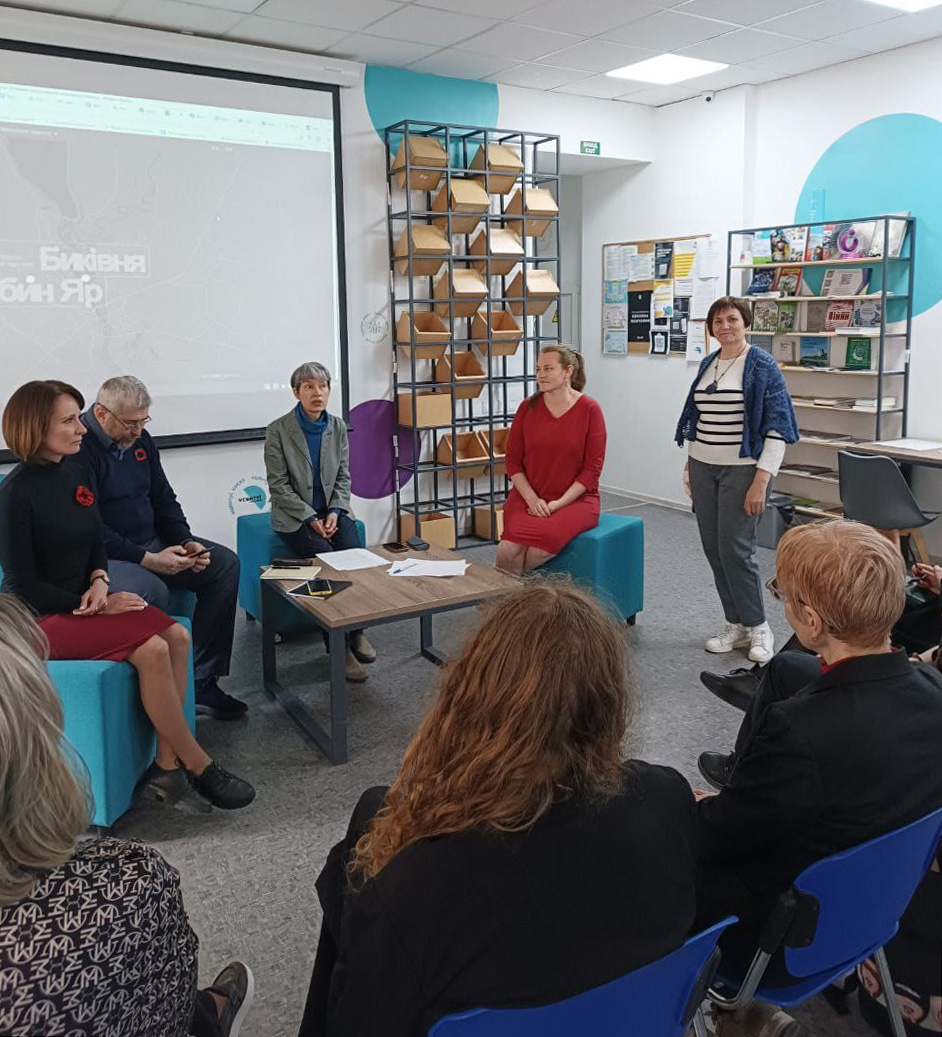 On May 8, 2025, – the Day of Remembrance and Victory over Nazism – a scientific and educational seminar and discussion of the Methodological Recommendations “How to talk to students about tragedies” were held within the framework of the project “Bykivnya. Babyn Yar. Bucha. Between the massacre and the memory of it” in the Vcentri HUB space (51B Volodymyrska St.).
On May 8, 2025, – the Day of Remembrance and Victory over Nazism – a scientific and educational seminar and discussion of the Methodological Recommendations “How to talk to students about tragedies” were held within the framework of the project “Bykivnya. Babyn Yar. Bucha. Between the massacre and the memory of it” in the Vcentri HUB space (51B Volodymyrska St.).
The seminar was organized within the framework of the Cooperation Agreement between the Center for Professional Development of Pedagogical Workers of Kyiv and the Institute for Cultural Research of the National Academy of Arts of Ukraine.
Seminar participants::
– Natalia Omelchuk, author of “Methodological Recommendations”, teacher of history;
– Anatoliy Podolskiy, co-author of the project, Ph.D. in Historical Sciences, leading researcher at the Kuras Institute of Political and Ethnic Studies of the National Academy of Sciences of Ukraine, head of the Ukrainian Center for Holocaust Studies;
– Hanna Baykenich, reviewer of “Methodological Recommendations”, Ph.D. in Pedagogical Sciences, head of the Department of Historical Research Organization and Analysis of Ukrainian Statehood of the Department of Scientific and Institutional Support of National Memory Policy at the Ukrainian Institute of National Memory;
– teachers of history in Kyiv schools.
The seminar was moderated by Nadiia Honcharenko, co-author of the project, senior research fellow at the Department of Cultural Heritage and Monument Preservation of the Institute for Cultural Research of the National Academy of Arts of Ukraine.
The moderator noted that the commemoration of the Day of Remembrance and Victory over Nazism on May 8 is a chance to move away from the celebration of Victory Day on May 9, saturated with Soviet-Russian propaganda, and instead to honor the memory of millions of victims of the war, waged by two totalitarian regimes of the 20th century: Nazism and Communism. Presenting the project “Bykivnya. Babyn Yar. Bucha. Between the massacre and the memory of it”, the moderator emphasized that in the language of facts, archival and photographic documents, through historical essays and artistic reflections, the project tells the Ukrainian and foreign audience about the mass crimes of totalitarian regimes of the 20th century and the authoritarian Russian regime of the 21st century.
They are different, but they had a lot in common – they were united by the use of state terror and mass violence as the main tool for regulating social life. Condemnation of the crimes of Nazism became the basis of the European culture of memory in the second half of the 20th century. The crimes of communism remained hidden, unpunished, while in the USSR those who tried to reveal them were punished. The Russian regime has not only inherited the dehumanizing rhetoric of the Nazis and Communists, but is proudly and openly using it to wage a genocidal war against Ukraine.
The seminar participants stated that the “Methodological Recommendations” developed by Natalia Omelchuk for high school students will help not only analyze the past, but also understand its role in the modern Russian war against Ukraine.

